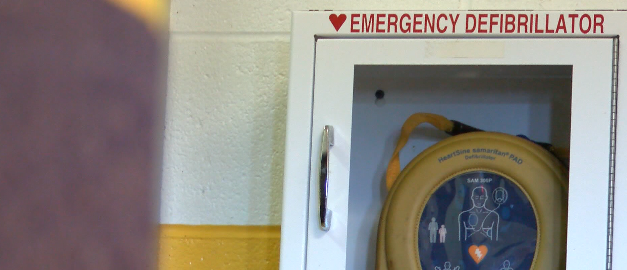National AED Shortage Places Millions at Risk

According to Richard Lazar, president of Readiness Systems, an AED monitoring company, the national shortage of AEDs is no small deficit. (Source: Christian Piekos)
SHREVEPORT, LA (KSLA) - Being prepared to respond with an AED (Automated External Defibrillator) is a heart-pounding nightmare.
It can mean the difference between life and death if someone goes into sudden cardiac arrest.
According to Richard Lazar, president of Readiness Systems, an AED monitoring company, the national shortage of AEDs is no small deficit.
"There's four million [AEDs] across the United States, we need more than 30 million," said Lazar. "Sudden cardiac arrest has to be treated within four or five minutes and that means an AED has to be located nearby."
To put this shortage in perspective, Lazar compared the AED shortage to the prevalence of fire extinguishers.
"Fire extinguishers are deployed everywhere and there are only 3,400 fire deaths a year," said Lazar. "For sudden cardiac arrest, there around 36,000."
A piece of potentially life-saving equipment Lazar said often goes unnoticed. He hopes more attention and funds are shifted to these devices.
"Legislators can certainly get involved by mandating that AEDs be deployed everywhere," said Lazar.
Lazar noted the often steep price tag is no excuse for a school district or governmental body to be unequipped with AEDs.
"If governing bodies have an interest in public safety, the safety of their students and staff, then AEDs ought to be a high priority."
After a KSLA News 12 investigation uncovered a shocking number of schools in Northwest Louisiana lacking AEDs, Lazar has tips for district and organizations in need of a device.
"There are companies that offer AEDs on a rental or leasing basis. That, of course, reduces the overall monthly cost for the device," said Lazar.
Lazar also suggested organizations host fundraisers, reallocate funds and even crowdsource their AEDs.
"AEDs have to be available, they have to be ready and they have to be retrieved and used when they're needed," said Lazar. "Anyone can and should be able to use an AED where it's located."
According to Lazar, the national sudden cardiac arrest survival rate is at less than eight percent. A number he hopes rises with more AEDs across the country.
Story Credit: http://www.ksla.com/story/38133356/ksla-investigates-national-aed-shortage-places-millions-at-risk


